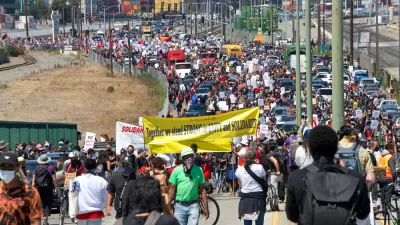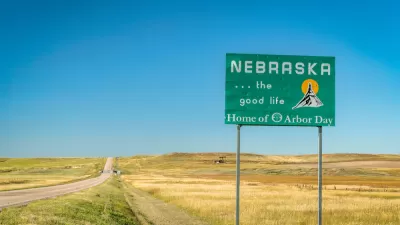Some motorists see open roads as an opportunity for stress relief. Transportation officials urge motorists to slow down, citing dramatically increased rates of speeding since the onset of the pandemic.

Recent data from transportation analytics company Inrix shows a 41% decrease in nationwide traffic compared to pre-pandemic figures. That drop is even greater in the nation's most populous cities with data showing a 50% decrease in Los Angeles and a 60% reduction in New York.
To the lament of transportation officials, this staggering drop in vehicle miles traveled does not translate to an equal decrease in auto-collisions which decreased a disproportionate 21% in the United States. "Reckless driving has increased dramatically since March, leading to a disproportionate number of speed-related crashes and fatalities, according to law enforcement and traffic experts," reports Luz Lazo.
Lazo points out that there are psychological reasons for increased reports of drag racing, reckless driving, and speeding (average speed doubled in many cities). A few factors are at play: open roads lead to faster-moving traffic and the opportunity to speed, a chance many drivers aren't willing to pass up for the sake of public safety. Researchers also find that more people are taking to the roads despite shelter-in-place mandates. Some drivers are combating boredom by taking joyrides, finding relief in the excitement and adrenaline rush that comes along with speeding. One psychologist compares the experience to a drug.
Public health officials urge drivers to slow down. As Lazo puts it, "hospitals are stressed, people are dying from the virus and a preventable crash would add another burden to first responders."
FULL STORY: The coronavirus pandemic emptied America’s roadways. Now speeders have taken over.

Planetizen Federal Action Tracker
A weekly monitor of how Trump’s orders and actions are impacting planners and planning in America.

Maui's Vacation Rental Debate Turns Ugly
Verbal attacks, misinformation campaigns and fistfights plague a high-stakes debate to convert thousands of vacation rentals into long-term housing.

San Francisco Suspends Traffic Calming Amidst Record Deaths
Citing “a challenging fiscal landscape,” the city will cease the program on the heels of 42 traffic deaths, including 24 pedestrians.

Amtrak Rolls Out New Orleans to Alabama “Mardi Gras” Train
The new service will operate morning and evening departures between Mobile and New Orleans.

The Subversive Car-Free Guide to Trump's Great American Road Trip
Car-free ways to access Chicagoland’s best tourist attractions.

San Antonio and Austin are Fusing Into one Massive Megaregion
The region spanning the two central Texas cities is growing fast, posing challenges for local infrastructure and water supplies.
Urban Design for Planners 1: Software Tools
This six-course series explores essential urban design concepts using open source software and equips planners with the tools they need to participate fully in the urban design process.
Planning for Universal Design
Learn the tools for implementing Universal Design in planning regulations.
Heyer Gruel & Associates PA
JM Goldson LLC
Custer County Colorado
City of Camden Redevelopment Agency
City of Astoria
Transportation Research & Education Center (TREC) at Portland State University
Jefferson Parish Government
Camden Redevelopment Agency
City of Claremont





























